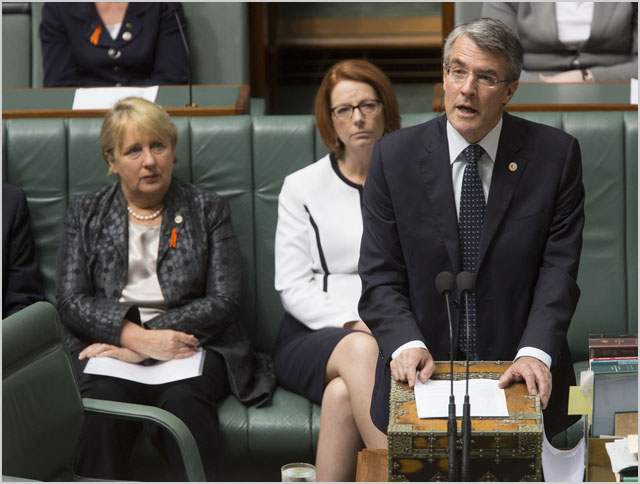
news Documents obtained by the ABC under Freedom of Information laws have shown that then-Labor Attorney-General Mark Dreyfus received a secret briefing on the US National Security Agency’s controversial PRISM surveillance program several months before the program was outed by whistleblower Edward Snowden.
In June, UK newspaper the Guardian published classified documents created by the agency, which stated that the NSA was able to gain “direct access” to the servers of companies such as Google, Facebook, Apple, Microsoft, Yahoo and Skype. The access allowed US officials to collect information including search history, the content of emails, file transfers and live chats.
Subsequently, the New York Times reported that the US Government had used the system to collect information on non-US citizens overseas for nearly six years. The revelation of the move has caused outrage online, amongst the general public as well as those specifically interested in digital rights and privacy online. Snowden has continued leaking classified information from the NSA’s surveillance activities to the Guardian and other media outlets since June.
However, in documents obtained by the ABC under Freedom of Information laws and published today, it was revealed that then-Labor Attorney-General Mark Dreyfus had been briefed on the PRISM program as early as March.
A listing of documents affected by the ABC’s FoI request (PDF) shows that on 21 March, Dreyfus received a “protected brief” on PRISM on 21 March, shortly after taking up his post in February. The ABC was refused access to the document under FoI laws, with the Attorney-General’s Department arguing that it should be exempted under national security stipulations.
In June, The Age newspaper reported that Australian intelligence agencies were receiving “huge volumes” of “immensely valuable” information from the United States including through the controversial PRISM program, with the “data deluge” requiring the Australian government to build a state-of-the-art secret data storage facility just outside Canberra.
However, Dreyfus and other politicians have consistently refused to discuss how Australian agencies are using the data.
In August, for instance, Dreyfus flatly refused to take part in a live election interview on key technology issues in his portfolio, such as copyright reform, data retention, telecommunications surveillance and Internet piracy, stipulating instead that all questions on the issues must be submitted in writing.
In answers to questions submitted in the Senate to Drefus by Australian Greens Senator and Communications Spokesperson Scott Ludlam in June, Labor Senator Joe Ludwig responded that Australia’s intelligence agencies operated under “a strong legal framework to protect Australians at all times, including when dealing with information from outside Australia”.
“Intelligence Services Act 2001 agencies, such as the Australian Signals Directorate, are required by law to obtain specific authorisation either from the Minister for Defence or the Minister for Foreign Affairs to produce intelligence on an Australian,” Ludwig said at the time. noting that for matters relating to threats to security, the Attorney-General must also support the approval.
However, Ludwig did not directly answer a number of questions put by Ludlam on how PRISM data might be being used in Australia.
In opposition, Communications Minister Malcolm Turnbull was also critical of the PRISM program.
“Australians will be very troubled by the allegation in The Guardian and The New York Times that the US National Security Agency is engaged in large scale, covert surveillance of private data belonging to non-US citizens held by American companies such as Google, Facebook, Apple, Microsoft, Amazon and Youtube,” said Turnbull in a statement in June.
“I think Australians have always understood data housed on US servers is subject to US laws such as the Patriot Act, but the Guardian story about the so-called PRISM programme suggests there is extensive surveillance and interception of foreign citizens’ data without a court order and indeed without the knowledge of the internet companies themselves.”
Turnbull said he had “raised the matter with the US Government’s representatives in Australia and sought clarification”.
Image credit: Attorney-General’s Department

“stated that the NSW was able to gain “direct access” ”
s/W/A/
Cheers, fixed.
s/Drefus/Dreyfus/
Comments are closed.